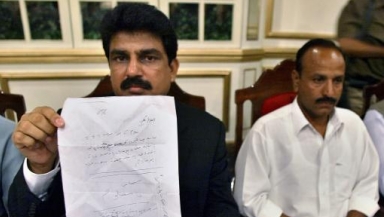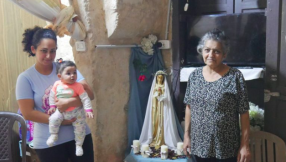
The killers of Pakistan's first Christian to become a federal cabinet member, Shahbaz Bhatti, have confessed to the crime, Bhatti's brother and security sources said.
According to a story by Morning Star News, Paul Bhatti, brother of the slain Federal Minister for Minority Affairs, said that security officials and a senior government minister had told him a suspect belonging to terrorist group Tehreek-e-Taliban Pakistan (TTP) had confessed to murdering Bhatti.
It was over his efforts to amend Pakistan's blasphemy laws and his support of Asia Bibi, a Christian woman sentenced to death for alleged blasphemy.
"The police had made a similar claim last year which proved untrue, and it seemed that they had given up tracing the killers, but this time I'm confident that they have the real culprits," Bhatti told Morning Star News by phone from Islamabad.
Federal Interior Minister Chaudhry Nisar Ali Khan met with Bhatti, the former minister of National Harmony and Minority Affairs, and shared the details of the investigation with him, Bhatti said.
"He told me that a suspected militant taken into custody had revealed during interrogation that besides conducting other terrorist attacks, his group had also killed Shahbaz Bhatti," he said.
The TTP is closely connected with Al Qaeda. The capture of three Islamic extremist suspects in connection with the assassination comes more than two-and-a-half years after the March 2 2011 murder in Islamabad.
Security agencies arrested Hammad Adil, brother of a current superintendent of police, about two weeks ago, along with Muhammad Tanveer, leader of a TTP cell in Islamabad. With the assistance of intelligence agencies, the suspects were arrested from their hideout in Phulgran, a suburban area of Islamabad. The security officials also seized a car laden with explosives.
During interrogation, Morning Star News reported, Adil and Tanveer revealed that besides carrying out terrorist attacks on foreign nationals and security installations, they had also murdered the Christian minister for voicing concern over the blasphemy laws, officials said.
A security official speaking on condition of anonymity told Morning Star News that the two suspects were accompanied by another Muslim extremist, Omar Abdullah, during the attack on Bhatti. He said that the three-member terrorist team carried out reconnaissance of Bhatti's movements for a few days before carrying out their plan.
"The minister was quite apprehensive about his security, especially after the murder of Punjab Gov. Salmaan Taseer, who was gunned down by his own police bodyguard for opposing the blasphemy laws, which is why he used to sleep at his mother's house after leaving his security detail at his own residence," he said.
The official said the assailants waited for Bhatti in a car outside his residence in Islamabad's I-8/3 Sector and opened fire as soon as they spotted the vehicle.
"Adil planned the ambush, while Tanveer provided them with the assault rifles and ammunition," he said.
Morning Star News reported police sources said that Adil and his group members were preparing for a large-scale terrorist attack in Islamabad at the time of the assassination. A suicide bomber, they said, from Pakistan's tribal areas was to drive the explosives-laden vehicle found during the raid into a key target in the capital, Islamabad.
Although law enforcement agencies have finally been able to catch the alleged killers of the Christian minister, it remains to be seen if they will be punished for their crimes in Pakistan's Byzantine justice system. Bhatti's brother, however, was optimistic that the killers would receive justice.
"I'm quite hopeful that the police and judiciary would do their job and punish these terrorists according to the law," he said. "These arrests and subsequent revelations have also vindicated our stance that my brother died for opposing the country's controversial blasphemy laws, and not over some property dispute as alleged by our detractors."
Pakistan's blasphemy laws, which can result in the death sentence or life in prison for those convicted, have been routinely misused to settle personal scores with false accusations.
Morning Star news said police have found most blasphemy accusations to be false during investigation, but accusers can make innocent victims suffer months in jail with quick and easy registration of such cases.
Of 5,000 cases registered between 1984 and 2004, only 964 people were charged with blasphemy, according to the Pakistani newspaper Dawn.
A recent study by the Center for Research and Security Studies (CRSS) found that from 1953 to July 2012, there were 434 people blasphemy "offenders" in Pakistan, including 258 Muslims, 114 Christians, 57 Ahmadis and four Hindus.
Those acquitted of blasphemy charges also face threats from homicidal vigilantes. Of 52 people extra-judicially murdered after being charged with blasphemy in Pakistan, 25 were Muslims, 15 were Christians, five were Ahmadis, one was Buddhist and one was Hindu, according to the CRSS report.
Most blasphemy case acquittals take place at the appellate level, after courts have denied bail so often that the accused spend years in jail, as lower courts tend to decide based on fear of violence by Islamist groups rather than on merit.
Asia Bibi has been sentenced to death after being incarcerated on false charges of blasphemy since Nov. 2010.
Blasphemy charges against Rimsha Masih, a girl whose mental age was determined to be less than 14 years old, were dismissed on Nov. 20 2012 after a judge ruled that they were baseless. She has since been relocated to Canada.
Pakistan is nearly 96 percent Muslim, according to Operation World, and religiously charged court cases commonly involve clamouring crowds of Muslims and other pressures coming to bear on lawyers and judges. Christians make up 2.45 per cent of the population.













